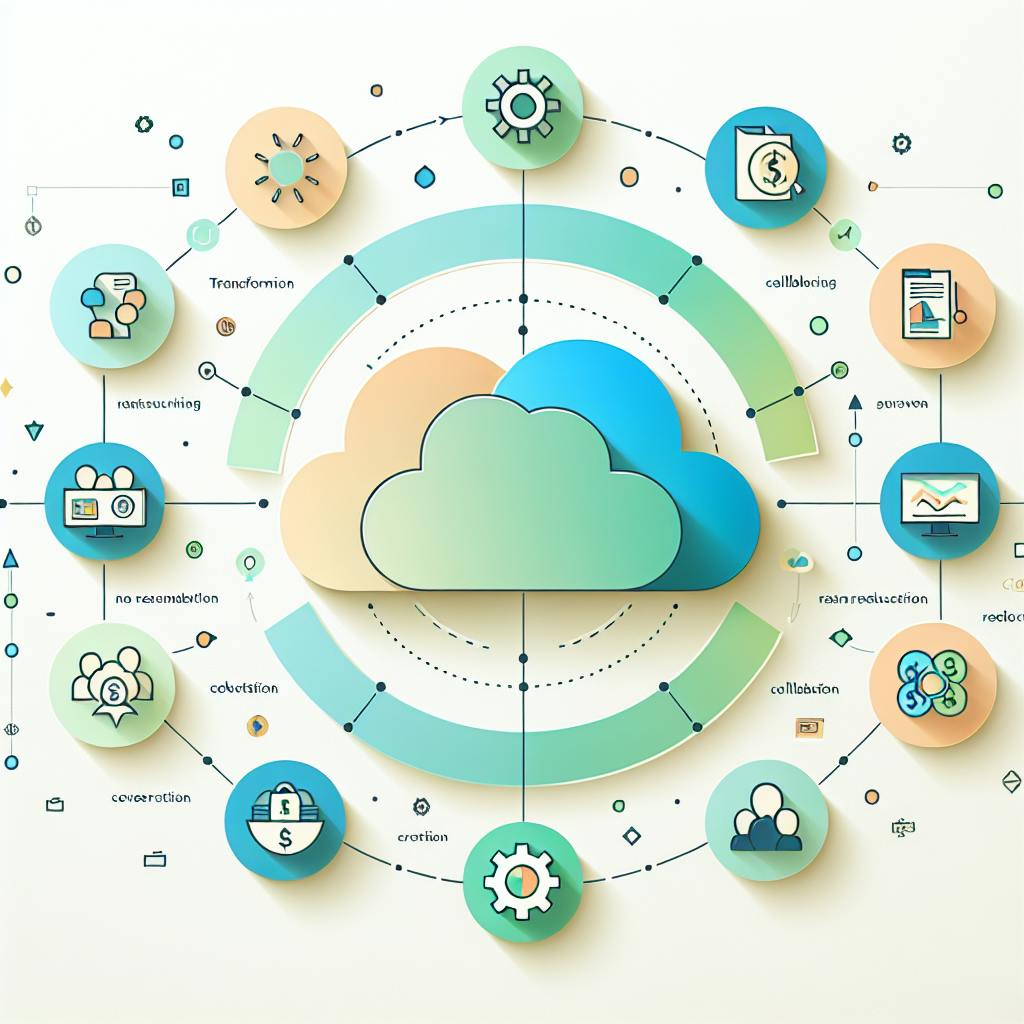The enterprise application software market is set to experience significant growth in 2024, driven by advancements in cloud computing, AI integration, and an emphasis on security and personalized user experiences. Here's what you need to know:
- Cloud-Based Solutions: The shift to cloud services allows for scalable, flexible, and accessible software solutions, expected to dominate the market.
- AI Integration: AI and automation are becoming integral, making software smarter and tasks more efficient.
- User Experience: A focus on intuitive design and personalized experiences is critical.
- Security: Enhanced measures to protect data are a top priority, given the increase in remote work.
- Industry-Specific Solutions: Customized applications tailored to specific industry needs are on the rise.
These trends indicate a move towards more adaptable, intelligent, and user-friendly enterprise software solutions, emphasizing the importance of staying ahead in technology adoption.
Mainframe Computing Era
- Started in the 1960s-1980s
- Used big, central systems for important tasks like accounting
- Expensive and complex, mostly for IT pros
- 71% of big companies still use mainframes for heavy-duty jobs
Client-Server Model
- Became popular in the 1980s-1990s
- Split tasks between personal computers and central servers
- More flexible than mainframes
- Still needed a lot of in-house tech and know-how
Web-Based Applications
- Came about in the 2000s with the internet getting better
- Run on remote servers, accessed through a web browser
- Easier to get to but had issues like slow speeds and security risks
Cloud Computing and SaaS
- From the 2000s to now
- Apps run over the internet, no need for your own hardware
- Can grow or shrink as needed, pay for what you use
- 85% of businesses expected to use SaaS by 2025, industry worth $700B by 2030
Mobile-First Era
- From the 2010s on
- Apps made for phones and mobile gadgets
- Lets people work from anywhere
- Americans spend over 4.5 hours a day on their phones
Integration of AI and Automation
- From the 2020s on
- Adds AI and smart data analysis
- Makes tasks automatic, offers deep insights from data
- Over 80% will use AI in their apps by 2026
In simple terms, business software has gone from big, clunky systems to being cloud-based solutions that we can use anywhere, anytime. Now, with AI integration, these apps are getting even smarter, making work easier and more efficient.
Major Trends Shaping the Enterprise Application Market in 2024
Increased Integration of AI
Artificial intelligence (AI) is getting added to business software to make them smarter and able to do tasks on their own. This includes:
- Using data to predict future sales or what items you'll need.
- Chatbots that can help customers any time of the day without a human.
- AI looking at how work gets done to find and suggest ways to do it better.
- Digging deep into data to understand it better.
By 2026, most businesses will have AI in their apps.
The Rise of Cloud-Based Solutions
More companies are using the cloud to run their apps. This is because:
- Cloud apps can grow or shrink based on what you need.
- You can get to your info from anywhere, on any device.
- Teams can work together in real time, even if they're in different places.
- It saves money since you don't need to buy and maintain expensive equipment.
- New updates and features can be added quickly.
Most businesses will be using cloud-based apps by 2025.
Adoption of Low-Code/No-Code Platforms
Now, you don't need to be a tech expert to make apps. Low-code/no-code platforms let anyone create apps quickly. This is great because:
- Teams can make the tools they need without waiting for IT.
- It takes less time and effort to make new apps.
- Even people who aren't tech-savvy can innovate.
Most app development will use these platforms by 2025.
Emphasis on User Experience and Design
Today's business apps are designed to be easy and enjoyable to use. This includes:
- Making apps look and feel like the ones we use for fun.
- Giving you a personalized experience.
- Making sure the app works well on all devices.
- Designing with the user in mind.
How an app feels to use is really important for companies making them.
Enhanced Security Measures
With more people working remotely and using the cloud, keeping data safe is a big deal. This involves:
- Making sure only the right people can access data.
- Following laws about data privacy.
- Using AI to spot and stop threats.
- Keeping data locked up tight.
Security is a top priority for tech leaders.
Expansion of Personalization in B2B Apps
Just like shopping sites remember what you like, business apps are starting to do the same. They can:
- Show you info and metrics that matter to you.
- Suggest actions based on how you use the app.
- Send reminders and alerts just for you.
- Use customer data to make the experience better.
Business buyers now expect apps to know what they need.
Consolidation of Technology Stacks
Companies are combining their tech tools to work better together. This helps by:
- Getting rid of duplicate apps.
- Making it easier for different departments to work together.
- Having one place to find all your info.
- Simplifying how work gets done.
- Reducing the cost and effort to keep apps running.
Many IT leaders want to streamline their tech tools.
Vendor Consolidation in SaaS Market
The market for cloud-based apps is seeing bigger companies absorb smaller ones. This is happening because:
- Basic services are becoming more common.
- Companies want all-in-one platforms.
- It makes buying and setting up services easier.
- Companies need to keep up with what their customers want.
We might see big deals happening in 2024.
Generative AI Becomes Mainstream
Generative AI, which can create content or analyze data on its own, is becoming a regular feature. This includes:
- Writing content automatically.
- Making sense of data and showing it in easy ways.
- Simulating outcomes to predict what might happen.
- Helping find information quickly.
Most companies plan to invest in this kind of AI soon.
Shift Towards Industry-Specific Solutions
More apps are being made just for certain industries, with features and tools designed for specific needs. This includes:
- Custom tools and ways of doing things.
- Data models that understand the industry.
- Predictive analytics that use industry data.
- Working well with older systems.
Apps made just for certain industries are expected to grow a lot.
The Future of Enterprise Applications
Looking ahead, the way companies use software to run their business is going to change a lot. This is mostly because of two big ideas: adding AI (Artificial Intelligence) to make software smarter, and moving more stuff to the cloud. Let's break down what this means.
AI Integration
Imagine your work software could think and learn like a human. That's what AI integration is all about. It helps your software do things like predict what your customers will want, answer questions any time of the day without needing a person, and even suggest better ways to work. The goal is to make everything more efficient and smart, and by 2024, it's going to be pretty common.
Cloud-Based Solutions
Cloud-based solutions are like storing your photos online instead of on your phone, but for business software. This means you can access your work tools from anywhere, on any device, as long as you have internet. It's flexible, usually cheaper because you don't need to buy expensive servers, and it makes teamwork easier since everyone can see updates in real-time. The move to the cloud is a big deal, making work more connected and less tied to one place.
In short, the future of enterprise applications is all about making software that's not only smart but also easy and flexible to use, thanks to AI and the cloud. This is going to make a big difference in how businesses operate, making things faster, smarter, and more connected.
sbb-itb-9890dba
Conclusion
The market for business software is set to grow a lot in 2024, thanks to some big changes. Here’s what’s happening:
First off, more companies are choosing software that they can use over the internet, like SaaS and cloud-based solutions. This is because they want systems that are flexible and can grow with them. We'll also see companies joining together to better meet these needs. At the same time, there's a move towards making software just for specific types of businesses.
Another big thing is the use of new tech like AI, machine learning, and ways to predict outcomes. These technologies are becoming must-haves, opening up new possibilities for businesses. In particular, generative AI is a game-changer, helping companies find insights and automate tasks more easily.
But, while all these cool innovations are happening, companies making this software can’t forget the basics. Things like always being available, keeping data safe, following rules, and making sure customers are happy are still super important. Companies will go for software that does all this well.
To wrap up, the business software world is going through a lot of changes in 2024. Companies that can use the latest tech while still nailing the basics will come out on top.
Related Questions
What is the software market in 2024?
In 2024, the global software market is expected to be valued at $698.8 billion, with business software making up $292 billion of that total. The entire software market is predicted to grow by about 5.27% each year from 2024 to 2028, reaching a value of $858.1 billion by the end of that period. This growth is mainly driven by more companies using cloud-based solutions and integrating AI into their operations.
How big is the ERP market in 2024?
The global market for ERP (Enterprise Resource Planning) software, which helps businesses manage and integrate their important operations, is expected to hit $52.33 billion in revenue in 2024. Looking ahead, this market could grow at an annual rate of 4.48%, reaching $62.36 billion by 2028.
What is the future of enterprise software?
The future of business software is leaning heavily towards using AI, machine learning, and automation. These technologies can help by:
- Doing repetitive jobs automatically
- Finding useful information in data
- Adjusting to new business needs quickly
- Making companies more efficient and productive
By 2027, it's estimated that over 80% of business software will use some form of AI. Cloud technology and mobile features will also play a big role in making work more flexible and teamwork easier.
What is the forecast for enterprise software markets worldwide?
The global market for business software is expected to reach $336.3 billion in 2023. It's predicted to grow at a rate of 12% each year until 2027, when it could be worth $580 billion. This growth will likely be fueled by more companies adopting AI, moving to cloud services, investing in tools that help people work together from different places, and focusing on software that's made for specific industries.



